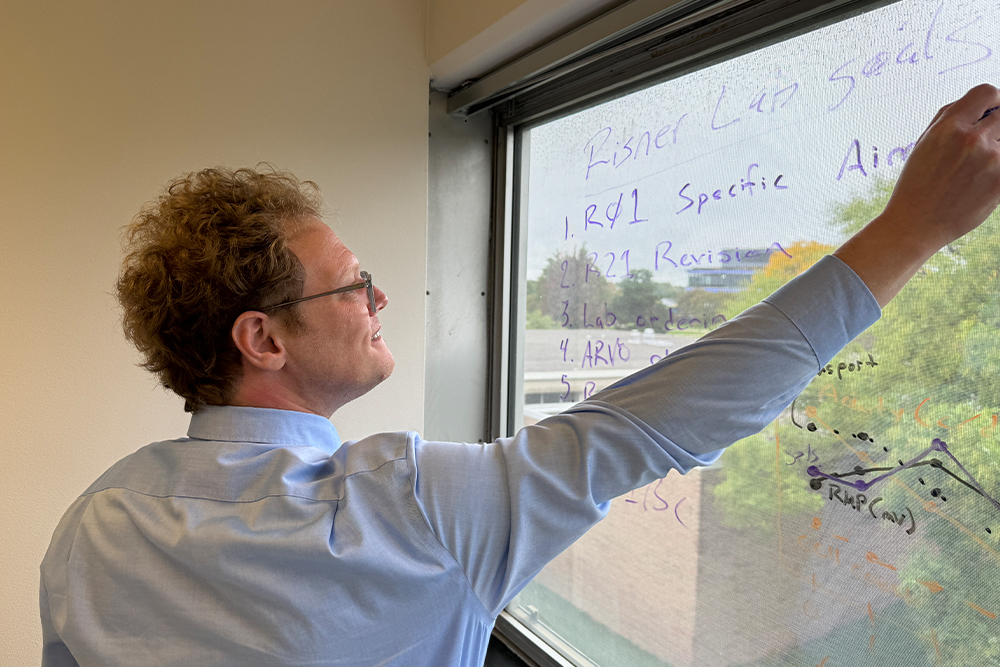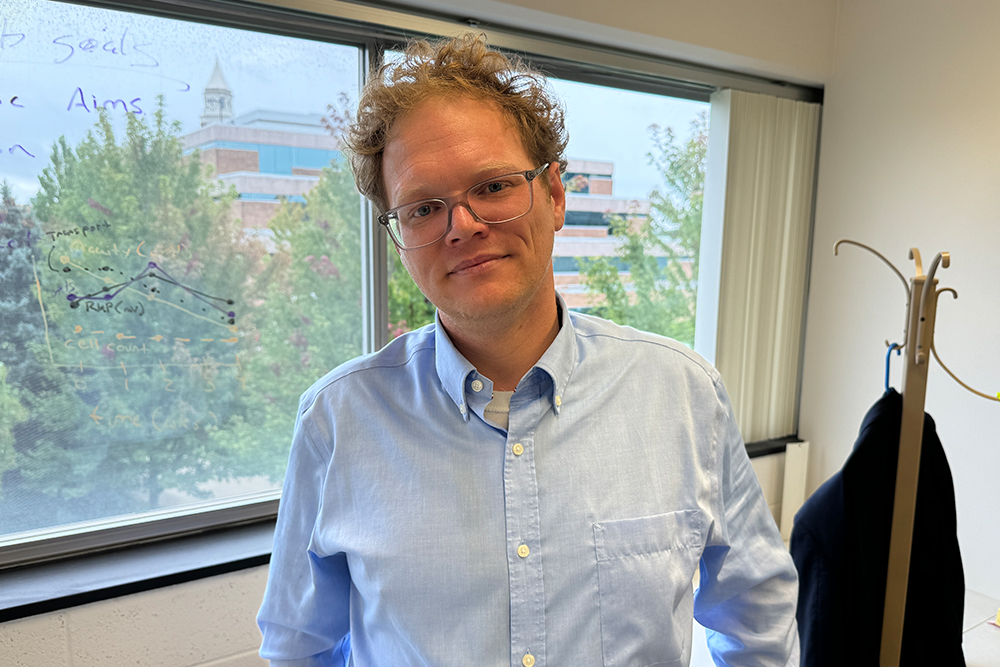A veteran researcher has joined Oakland University William Beaumont School of Medicine and set his sights on a big goal: working towards a cure for glaucoma.
Michael Risner, Ph.D., began at OUWB on Sept. 1. He’s an assistant professor in the Department of Foundational Medical Studies in the investigator track at the Eye Research Institute at OUWB.
Risner joins OUWB having spent the past eight years at the Vanderbilt Eye Institute at Vanderbilt University Medical Center in Nashville. His work centers on investigating the pathophysiology of glaucoma, the world’s leading cause of irreversible blindness. Already having published more than 30 papers, he plans to continue his work at OUWB.
“In addition to leading a robust vision research laboratory, I look forward to enriching the educational experience at OUWB by mentoring medical, graduate, and undergraduate students because they will be tomorrow's leaders in our community and worldwide,” says Risner.
Mohamed Al-Shabrawey, M.D., founding director, Eye Research Center, OUWB, says Risner fills an important role at OUWB because, until now, glaucoma hasn’t been a research focus at the school.
“We at the ERC/ERI will work with Dr. Risner to make sure he is continuing his productivity and securing (National Institutes of Health) funds for his independent translational research on glaucoma,” says Al-Shabrawey.
Working in a factory to studying zebrafish
Risner grew up in a small town called Hartwell in northeast Georgia.
A self-described “voracious reader” as a youngster, Risner said he would spend days just reading encyclopedias or attending scientific conferences held by local 4-H clubs.
He graduated from high school with a college preparatory diploma as well as a trades diploma and immediately started working at a local automotive supplier.
Risner says he was happy working for the manufacturer, in large part “because I always had money in my pocket.”
 Risner writes out his goals for the next year. Risner writes out his goals for the next year. | |
 Risner writes out his goals for the next year. Risner writes out his goals for the next year. |
However, his father also worked at the same company and wanted his son to go to college.
“He got me fired so I wouldn’t have any money and no other choice,” says Risner with a laugh.
By his third year at Emmanuel College, Risner had determined that post-secondary education offered “a pretty cool environment.” As he puts it, “the rebelliousness of my teenage years was in my rearview mirror, and I was ready to learn.”
“I got to study all kinds of things I didn’t study in high school…stuff like psychology and philosophy,” he says.
He would go on to earn a bachelor's degree in psychology from Emmanuel. With no desire to slow his learning, Risner then moved on to a master’s program at Western Kentucky University.
He thought he was going to continue studying general psychology, but then changed course.
“I realized that I didn’t like what I was doing or learning about and didn’t really see it as my future, so I decided to try research,” he says.
Risner joined the lab rumored to be the toughest and began studying color vision in zebrafish.
“Zebrafish are an awesome model for color vision because they have all the photoreceptors that we humans have,” he says.
Risner says he discovered the enjoyment and satisfaction of getting into the “research zone,” where one loses track of time because they’re so in the flow of whatever they’re working on, and the biggest disruption is “when your stomach tells you you’re hungry.”
‘Different for the better’
From there, Risner would go on to earn a doctorate in neuroscience from the University of Alabama at Birmingham.
For his post-doctoral fellowship, Risner went to Vanderbilt University, where he threw himself completely into his research. After his post-doc, he stayed at Vanderbilt, serving as a staff scientist, research assistant professor, and affiliate. He was there for 13 years.
He calls it a “productive time.” Most of the 30-plus papers he’s published were done while at Vanderbilt.
But, says Risner, he wanted something more, which is why he was interested in OUWB.
Specifically, he wanted to be an independent investigator with his own lab space. He says this is key to landing research funding, like the $200,000 he received from the BrightFocus Foundation in 2022 for “Harnessing Intercellular Mitochondrial Transfer Between Retinal Celes for the Treatment of Glaucoma.”
“As I did my research on the ERI and ERC, including the history, it was everything that I really wanted,” says Risner. “Coming from Nashville, I was looking for some place smaller, and with a strong vision and commitment to research.” Overall, he says, he’s excited about his future at OUWB because “it’s different for the better.”
Over the next year, Risner plans to continue his glaucoma research, have his lab fully established, continue pushing for additional funding, publish at least one review paper, and present research at a national conference.
It’s that kind of background that has Al-Shabrawey especially excited about the addition of Risner — and what it could one day mean to patients.
“Dr. Risner has been trained at Vanderbilt Vision Research Center, Vanderbilt University, one of the leading labs in this area,” he says. “Understanding the molecular and cellular mechanisms of glaucoma will lead to new therapies to save the sight of glaucomatous patients. Also investigating the potential benefit of stem cells in retinal regeneration may lead to beneficial clinical applications in retinal degenerative diseases.”
For more information, contact Andrew Dietderich, marketing writer, OUWB, at adietderich@oakland.edu.
To request an interview, visit the OUWB Communications & Marketing webpage.
This work is licensed under a Creative Commons Attribution-NonCommercial 4.0 International License.


